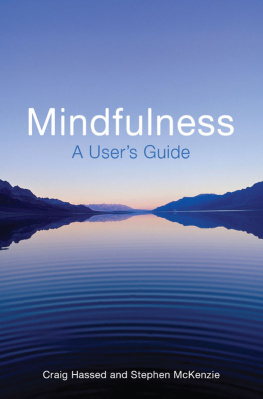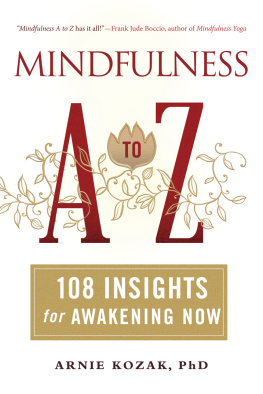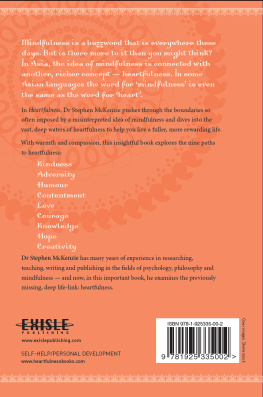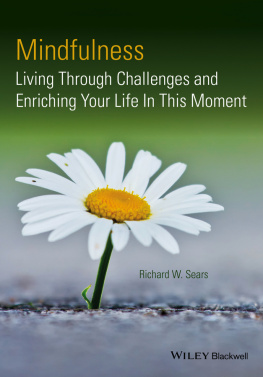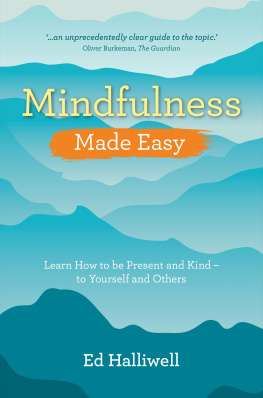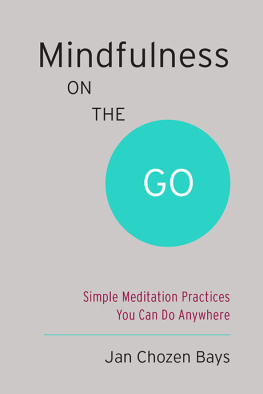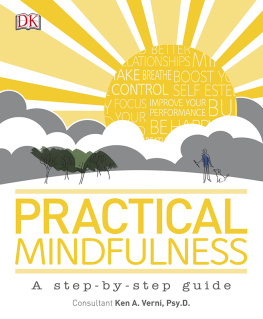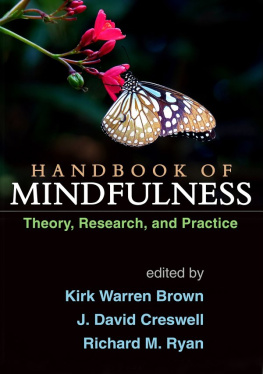Dr Stephen McKenzie has over twenty years of experience in researching and teaching a broad range of psychological areas, including depression, dementia, substance abuse, and most recently, mindfulness. Dr McKenzie has a unique ability as a lecturer, researcher and writer to present potentially complex information in a warm, engaging and entertaining way. He is currently a lecturer and research fellow at Deakin Universitys School of Psychology, where he is investigating mindfulness as a clinical treatment.
Dr Craig Hassed is an internationally recognised expert in mindfulness who has widely presented at national and international seminars and conferences and has published extensively in the areas of mindbody medicine and mindfulness. Dr Hassed devised and presents an innovative mindfulness training program for medical students at Monash University. His program has also been included in elective programs at other universities in Australia and overseas. He has worked with many other experts in the area of mindbody medicine and mindfulness, and has been instrumental in promoting mindfulness as a simple, natural and accessible technique for enhancing wellness, preventing and managing illness, and improving performance within health, educational and corporate settings. Dr Hassed is the founding president of the Australian Teachers of Meditation Association.
mindfulness
FOR LIFE
Dr Stephen McKenzie and Dr Craig Hassed
Constable & Robinson Ltd
5556 Russell Square
London WC1B 4HP
www.constablerobinson.com
First published in Australia in 2012 by Exisle Publishing
First published in the UK by Robinson,
an imprint of Constable & Robinson Ltd, 2012
Copyright Dr Stephen McKenzie and Dr Craig Hassed, 2012
The right of Dr Stephen McKenzie and Dr Craig Hassed to be identified as the authors of this work has been asserted by them in accordance with the Copyright, Designs and Patents Act 1988
All rights reserved. This book is sold subject to the condition that it shall not, by way of trade or otherwise, be lent, re-sold, hired out or otherwise circulated in any form of binding or cover other than that in which it is published and without a similar condition including this condition being imposed on the subsequent purchaser
A copy of the British Library Cataloguing in Publication data is available from the British Library
Important
This book is not intended as a substitute for advice or medical treatment. Any person with a condition requiring medical attention should consult a qualified medical practitioner or suitable therapist.
ISBN 978-1-78033-839-2
eISBN 978-1-78033-909-2
Printed and bound in the UK
To Melanie, Miranda and Deirdre
With love and gratitude
FOREWORD
Why is it that mindfulness has become so popular? Why has mindfulness gained such widespread acceptance amongst the medical and scientific communities? And why are so many people attracted to learning and applying it in their daily lives? The answer is really quite simple. Mindfulness works!
As this excellent and timely book explains, mindfulness is the practice of paying attention knowing where our attention is and being able to choose where to direct it. This way of training our mind leads to increased awareness, the capacity to give our full attention to everything we do, and it helps us to learn how to let go of judgment, along with stress and anxiety. Mindfulness provides a reliable means for establishing peace and clarity amongst a complex and busy world.
The wonderful reality of mindfulness as a state of mind is that not only does it work but it is also easy. It is easy to teach, easy to research, easy to learn, and easy to apply in daily life.
Mindfulness for Life has many strengths. Firstly, it has been written by two leaders in this field who are teachers, researchers and practitioners. Craig and Stephen both speak from their personal experience of this practice, but then they add the combined benefit of their many years of teaching and researching the subject.
In the book they clearly set out the benefits of practising mindfulness in a formal sense by sitting down and paying attention to the present moment, free of judgment or distraction. What they then describe is how readily this formal practice translates into a way to live our lives, moment by moment, being mindful.
Another great strength of the book, and why so many people will benefit from reading it, is that the authors examine the real-life experiences and the associated research that accompanies applying mindfulness in three major areas of life: medical and pre-medical conditions, personal development and spiritual development. This combination of personal accounts from people who have transformed their lives through the simple practice of mindfulness, along with highly accessible summaries of the relevant research, makes for compelling reading.
Do read this book. Do give it to someone you care about. The evidence is clear. Mindfulness has the real potential to generate inner peace, foster physical and psychological healing and lead to a heightened sense of wellbeing and connectedness. This book tells you how to do it and will support you becoming more mindful.
Ian Gawler OAM
Author of Meditation An In-depth Guide
and The Mind that Changes Everything
PART 1
MINDFULNESS
What is it and can it help?
CHAPTER 1
Introduction to mindfulness
Where are you now?
Which of the following makes you happiest: being distracted by pleasant imaginings, being distracted by neutral imaginings, being distracted by unpleasant imaginings or paying attention to what you are doing? Well, according to a recent study from Harvard University, simply paying attention to what we are doing makes us happiest. This might seem strange because mostly we think that our daydreams, especially the happy ones, are interesting and the source of much of our contentment. Perhaps by the end of this chapter the relationship between our attention and our happiness will make a lot more sense. This book is simply about paying attention in other words, mindfulness and the profound happiness and health benefits that this can give us.
Have you ever walked into a room and forgotten why you went there? Have you ever waited for the weather report and when the forecast is given not even hear what the weather-person says? Have you ever driven your car somewhere and not remembered the journey? Do you ever find yourself in a conversation with somebody and then suddenly wake up to the fact that you are not taking in a word of what they are saying? Do you ever find yourself reading a book (not this one, we hope!) and realising halfway through the chapter that you havent taken in a word? Well, if you answered yes to any of these questions, then you know something about what it means to be unmindful.
Our tendency to not be fully present in our life as it happens has vast implications and can result in our missing out on our full life potential. Being unmindful means wasting our lifetime, missing important information, increasing our risk of physical and social accidents and communicating more superficially with other people. Importantly, it makes us unhappier than we realise and more vulnerable to stress and poor mental health and all of the harmful physical consequences that can follow. We will discuss this in more detail later.
Whether unmindfulness is more common today than it once was is hard to say, but mostly these days we find ourselves rushing, rushing, rushing from cradle to grave without ever really appreciating the bit in the middle. If we are not distracted by speeding through life then we might find ourselves distracted by boredom and inertia. Whether it is too fast or too slow, modern life just doesnt seem balanced. Looking at the pace of our modern life and its constant bombardment of information and disinformation, it would be reasonable to conclude that we have created a world that almost encourages the problem.
Next page
